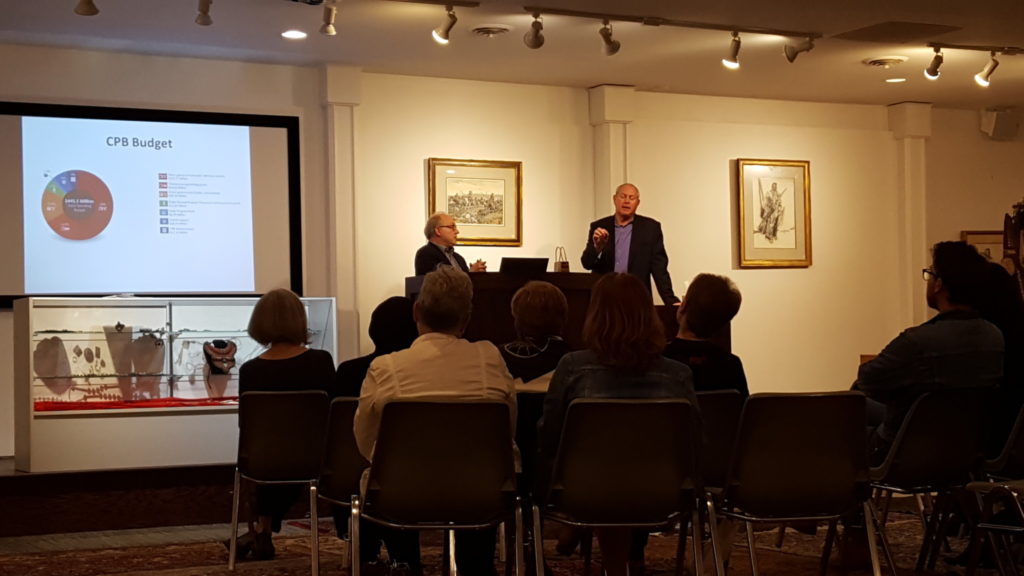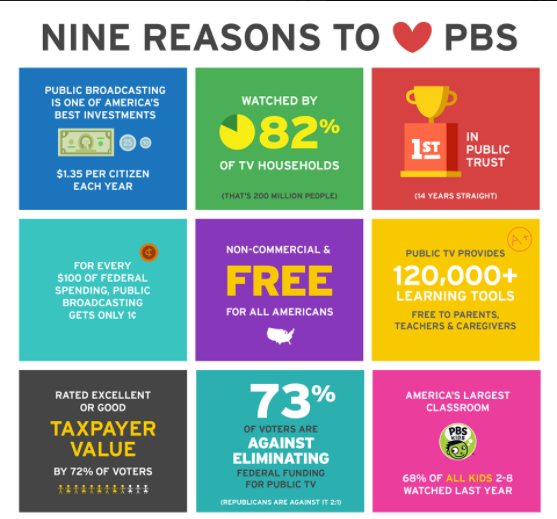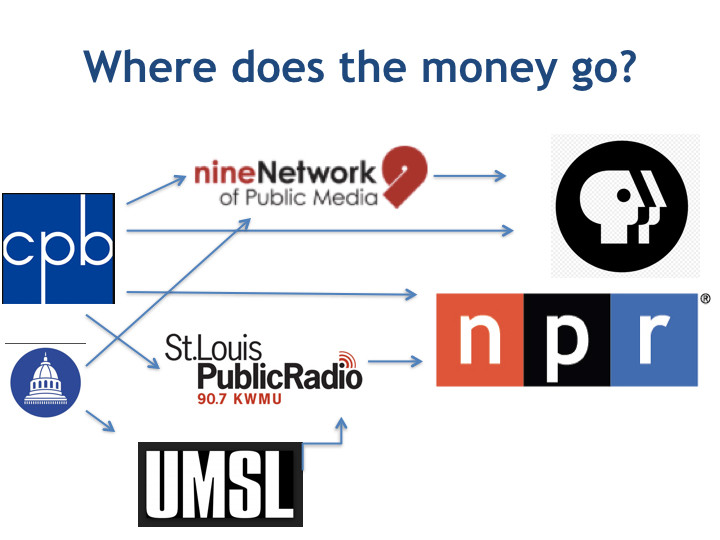
The Corporation for Public Broadcasting (the largest source of funding for public radio, television, and related online & mobile services) is celebrating its 50th anniversary this year, though the term “celebrating” is a bit of a stretch since funding for CPB, created by Congress in 1967, is on the new administration’s chopping block. A headline from yesterday’s Wall Street Journal reflects the concern of public radio affiliates: Station operators fear President Donald Trump is targeting the CPB, which doles out money to nearly 1,500 stations.
As fans of St. Louis Public Radio, CWE Ideas founders Eric Hamblett and I thought a conversation about how public radio is funded would be a compelling topic to launch our 1st Thought Salon. Last Thursday, Chief Content Officer of PRX (Public Radio Exchange) CWEnder John Barth, above left, and St. Louis Public Radio’s General Manager Tim Eby, above right, offered food for thought at Selkirk Auctioneers & Appraisers, 4739 McPherson Ave. Selkirk’s Director Sarah Cunningham and Consignment Representative Bryan Laughlin generously offered to host the event against a backdrop of Indian artifacts, masks, and Oriental rugs that were in place for the March Auction scheduled for last weekend.
Keeping Public Broadcast Alive, What You Need to Know, What You Can Do, attracted approximately 36 people, including several who had worked for public radio in different parts of the country. Since Barth and Eby have known each other for years, the conversation was relaxed and extremely informative.
Most of us were surprised to learn that CPB is “a private, nonprofit corporation created by Congress in the Public Broadcasting Act of 1967. It’s the steward of the federal government’s investment in public broadcasting and the largest single source of funding for public radio, television, and related online and mobile services. CPB’s mission is to ensure universal access to non-commercial, high-quality content and telecommunications services. It does so by distributing more than 70% of its funding to nearly 1,500 locally owned public radio and television stations.”
Public radio stations are privately owned (St. Louis Public Radio is owned by UMSL), and each station takes on the flavor of its location. Barth reminded the audience that many parts of the U.S. do not have internet access, so public radio is the go-to source for news.
An audience member who had worked for public radio in West Texas said that each public radio station also reflects the interests of its listeners. So programming in West Texas is much different than it is in St. Louis, for instance. Another attendee mentioned that she noticed a big difference when she moved from Omaha to St. Louis – St. Louis Public Radio is much more conservative than public radio in Omaha.
John Barth added that there is a perception that public radio leans liberal when in fact it is compelled to report the news objectively. Tim Eby said that each station has its own ombudsman, who represents the listener and is charged with making certain the station stays objective.
In a nutshell, here are


Here’s where funding comes from:
Corporation for Public Broadcasting (CPB), which is funded 2 years in advance to protect it from politics in Washington. So proposed budget cuts won’t necessarily make a difference immediately, though West Virginia Public Radio is already seeing signs that it may have to cut employees, due to possible budget cuts in the state legislature. This just in: West Virginia governor proposes restoring funds for West Virginia Public Radio.
Foundations (Knight, MacArthur, Ford etc)
Underwriting
Major gifts/individuals
Pledges (YOU!) (fund drives, such as the Spring Fund Drive that just ended on St. Louis Public Radio)
State support: Missouri’s Governor Greitens just cut funding to public universities (UMSL), which effects St. Louis Public Radio.
Earned revenue (from special events)
One of the younger attendees mentioned that more and more of her friends are asking where they can find real news. She tells them public radio.
If you are so inclined, here is a list of Congressmen you can contact to help protect funding for the Corporation for Public Broadcasting.
- Senator Roy Blunt (MO): Chair of Appropriations Subcommittee (HHS & Labor)
- Senator Mike Enzi (WY): Chair of Senate Budget Committee
- Senator Thad Cochran (MS): Chair of Senate Appropriations Committee
- Senator Patrick Leahy (VT): Vice Chairman of Senate Appropriations Committee
- Congressman Jason Smith (MO 8th District): Member House Ways & Means Committee
At a time when more and more people are listening to public radio and viewership of PBS News Hour has risen dramatically, it’s important that we all do what we can to help. Though the Spring Member Campaign has ended, it’s never too late to make a contribution to St. Louis Public Radio. Here is a link to make it easy (consider a sustaining membership).
Tim Eby said at the close of the q & a portion of the evening:
“We need more of this type of (civilized) discussion in this country.”
We couldn’t agree more. Eric and I are working on our next event(s) which will be announced soon. In the meantime, if there are any topics you would like to learn more about, please email us ([email protected], or [email protected]) and we’ll try to make it happen.
